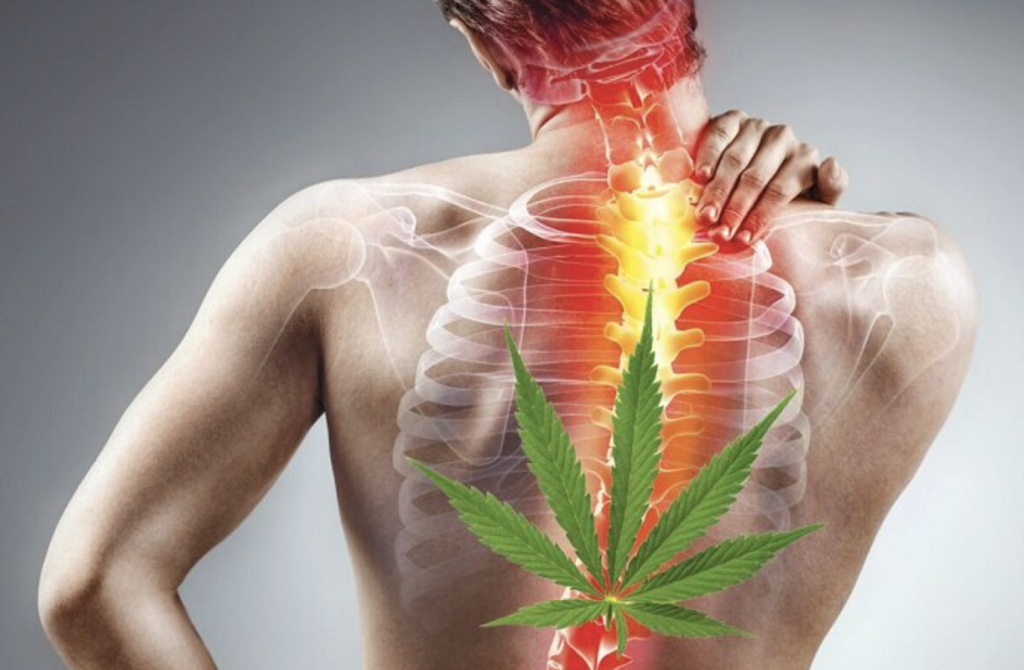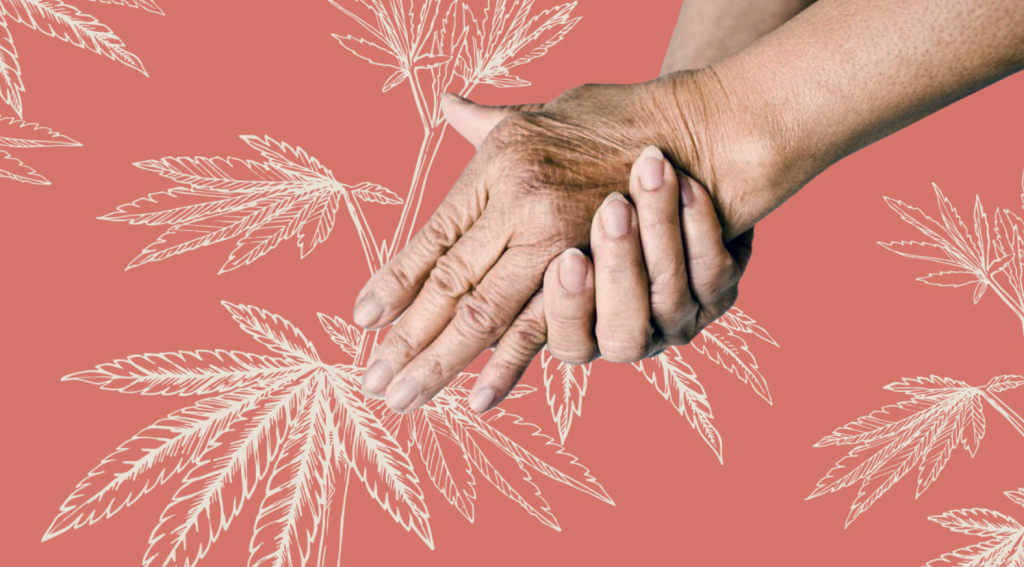
In this article, we will talk about how medical cannabis can help with Arthritis. The first step in getting medical cannabis is getting your medical marijuana recommendation online from a licensed medical practitioner. Feel free to sign up on FadeMD to schedule a time with a licensed medical practitioner to see if medical cannabis is right for you.
Arthritis is one of the most common musculoskeletal diseases and affects the joints in particular. This disorder usually involves the inflammation or degeneration of the joints. The most common complaint among the affected individuals is pain and difficulty in moving the joint(s) involved. The joints are naturally cushioned with soft tissues which serve as shock pads that help in the smooth gliding of the bones over one another without friction. The soft tissues that are involved in this mechanism are called articular cartilages and synovial membranes. [1]
In the U.S, arthritis is ranked first among the causes of disability with up to 50 million adults and 300,000 children have diagnosed with the condition. It affects the general population irrespective of age, sex, and race. Arthritis affects different joints of the body but is commonly seen in the hands, hips, lower back, knees, and feet. When one joint is affected, it is called monoarthritis, two or three joints, oligoarthritis whereas when four or more joints are affected it is known as polyarthritis.[1]
What are the types of Arthritis? [2]
- Osteoarthritis: this is the most common type that develops when cartilages of the joint breaks down due to constant stress. It is often referred to as “wear and tear” arthritis
- Ankylosing spondylitis: This form of arthritis is commonly seen on the spine and the majority of the cases occur at old age.
- Juvenile arthritis (JA): An autoimmune disorder where the immune system of the patient attacks the tissue of the joints. It is typically seen in children below the age of 16.
- Gouty arthritis: This is a metabolic disease that results from the deposition of hard crystals of uric acid in the joints.
- Psoriatic arthritis: A joint inflammation disease that is seen in patients suffering from psoriasis (an autoimmune disorder that causes skin irritation).
- Rheumatoid arthritis: An autoimmune disease that results from the immune system attacking synovial membranes in your joints.
What causes arthritis?
For each type of arthritis, there is a definite cause but in general, the exact pathogenesis of this condition is yet unknown. Many studies have suggested several possible causes which include: [2]
- Injury – leads to degenerative arthritis common in elderly patients
- Metabolic disease – which is seen in gouty arthritis or pseudogout
- Genetic cause – mostly seen in cases of osteoarthritis
- Infections – common in the arthritis of Lyme disease
- Immune system dysfunction – an autoimmune disease condition such as in Rheumatoid arthritis and systemic lupus erythematosus (SLE)
Despite these possible causes of arthritis, they are several risk factors that can predispose one to arthritis. These are grouped into modifiable and non-modifiable factors. [1]
- Non-modifiable factors: Age, Sex, Genetic factors
- Modifiable factors: Overweight and obesity, Joint injuries, Infection, Occupation, Comorbidities, HTN, Smoking
Signs and symptoms of Arthritis
The general symptoms of arthritis include pain and limited function of joints. Joint inflammation from arthritis is characterized by joint stiffness, swelling, redness, pain, and warmth.
In other forms of arthritis such as Rheumatic arthritis in which the disease affects other organs of the body, the patient may experience other symptoms which may include; [3]
- Fever (high or low grade)
- Lymph nodes swelling
- Weight loss
- Fatigue
- Malaise and
- Symptoms relating to some organ dysfunction.

The Role of Medical Cannabis in the Management of Arthritis
Cannabis sativa, is a plant that has been in history for both its medicinal properties and its recreational use. Researchers have suggested that cannabis can be the likely solution in the treatment of arthritis-associated pains. Medical cannabis on several occasions has been used in alleviating pains and other symptoms relating to autoimmune diseases. Although the exact mechanism of action of these compounds has not been fully known, yet the health benefits may have proven to be the long-awaited solution in pain management and treatment of other disorders. Different compounds have been extracted from the Cannabis plant but Tetrahydrocannabinol (THC) and Cannabidiol (CBD) are the two components with the highest concentrations. The studies on these compounds led to the discovery of the Endocannabinoid System (ECS) which is made up of the Cannabinoid receptors, endogenous cannabinoids (anandamide), and degrading enzymes. [4]
- Inflammatory pain – Inflammation is a protective mechanism that promotes wound healing and limits the spread of infection. During inflammation, there is pain, swelling, redness, and loss of function. CBD has been shown to exert an analgesic effect in severe inflammatory pains which are commonly experienced by arthritic patients. A study demonstrated that CBD administration reduced the levels of pro-inflammatory factors (Interleukin-6 and Tumour necrosis factor α) and increased the anti-inflammatory cytokines leading to the modulation of the inflammatory process. [5] In a similar study, CBD was shown to decrease the levels of Interferon-γ (IFN-γ) secreted by the lymph node cells and reduced the production rate of TNF-α by the synovial cells at the knee joint. [6]
- Cell death or apoptosis – Another mechanism of action of cannabinoids is through induction of cell death or apoptosis in the immune cell populations. The THC has shown some apoptotic properties according to studies done through the ligation of CB1 and CB2 receptors and the activation of caspases. Despite their activities in inducing apoptosis in immune cells, cannabinoids are known to protect other cells from apoptosis in conditions such as Multiple sclerosis.
Further studies have shown that cannabinoids express anti-inflammatory properties through induction of apoptosis, inhibition or suppression of cytokines production and induction of T-regulatory cells. Currently, the effectiveness and safety of medical cannabis in the treatment of arthritic pain have not been supported by any medical evidence with the legal restrictions on marijuana limiting the studies. [7]
As we move forward, we believe that more studies will be conducted on the effectiveness and safety of medical cannabis in medical practice. As we hope that the government in different regions will lift the restriction law on the use of cannabis not just for its recreational effects but for patients who may need that to get relief from their ailments
How To Get Your Medical Marijuana Card Online
The first step to getting your medical marijuana recommendation online (also called your mmj recommendation) is to sign up on FadeMD. Once you sign up you will need to answer some basic medical questions and then schedule a time to speak with a licensed medical practitioner. If approved you will then need to complete your state-specific application and pay any state-mandated fees. Once the state approves your application the state will issue your mmj card.
Disclaimer: The information, including but not limited to, text, graphics, images and other material contained in this article are for informational purposes only. No material from this article is intended to be a substitute for professional medical advice, diagnosis, or treatment. Always seek the advice of your physician or other qualified health care provider with any questions you may have regarding a medical condition or treatment before undertaking a new health care regimen. Never disregard professional medical advice or delay in seeking it because of something you have read on this website.
References:
- https://my.clevelandclinic.org/health/diseases/12061-arthritis
- https://www.medicinenet.com/arthritis/article.htm
- https://www.medicalnewstoday.com/articles/7621#_noHeaderPrefixedContent
- https://www.ncbi.nlm.nih.gov/pmc/articles/PMC2828614/
- Verrico CD et al., A randomized, double-blind, placebo-controlled study of daily cannabidiol for the treatment of canine osteoarthritis pain. Pain. 2020; 161:2191–2202. Doi: 10.1097/j.pain.0000000000001896
- Malfait AM et al. The nonpsychoactive cannabis constituent cannabidiol is an oral anti-arthritic therapeutic in murine collagen-induced arthritis. Proc Natl Acad Sci USA. 2000; 97:9561–9566.
- https://www.ncbi.nlm.nih.gov/pmc/articles/PMC7700528/
